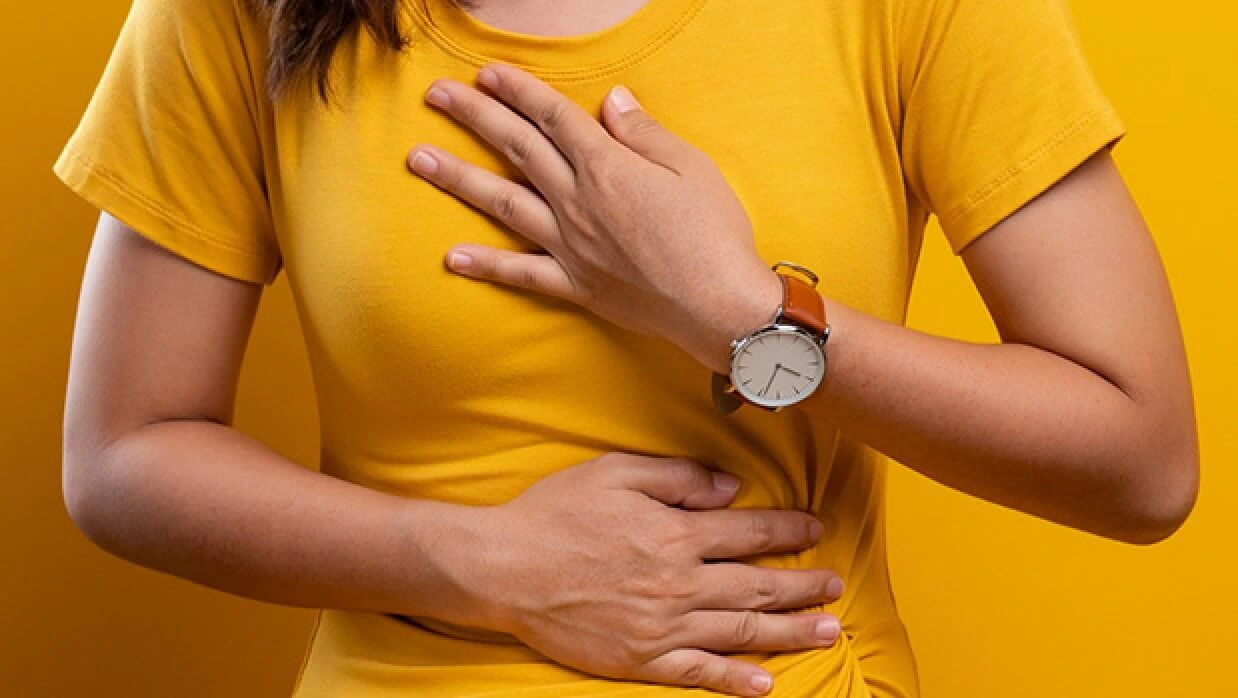Heartburn is a burning sensation, often behind your breastbone, that may appear to be a chest pain. It is a common symptom of acid reflux, which is when acid flows backward from your stomach into your esophagus1.
The triggers that cause heartburn vary from person to person, but may include:
Diet
Smoking
Being overweight1.
There are key differences between heartburn, acid reflux and GERD (gastroesophageal reflux disease). Persistent acid reflux may develop into GERD, while Heartburn is a symptom of acid reflux. In fact, heartburn two or more times a week is the most common symptom of GERD2.
Read on for our guide to heartburn symptoms and relief – including heartburn medicine and home remedies.
How Does Heartburn Happen?
Heartburn is caused by a backward flow, or reflux, of stomach acid into your esophagus.
Your lower esophageal sphincter – the part where your esophagus connects to your stomach – prevents the contents of your stomach from escaping.
But sometimes it relaxes or weakens and allows acid to flow backward into the esophagus. Since your esophagus isn’t resistant to acid the same way your stomach is, it can cause a burning sensation1.
What Causes Heartburn?
When considering common heartburn causes, it’s important to look at both the health-related factors behind it, and the diet-related issues that can trigger flare ups.
Some common causes and triggers of heartburn include1:
Being overweight
Being pregnant
Smoking cigarettes
Drinking alcohol
Heartburn can also be triggered by eating or drinking1:
Spicy foods
Onions
Ketchup
Fried foods
Fatty foods
Peppermint
Chocolate
Coffee
Learn more about what causes heartburnwith our in-depth guide.
How Long Does Heartburn Last?
When you start to feel that tell-tale burning sensation in your chest, you may wonder how long your heartburn will last.
It’s hard to give a precise time, as heartburn symptoms can last as little as a few minutes, or as long as several hours. Generally, however, the symptoms should begin to ease once you’ve properly digested your most recent meal.
That will often take around two hours, though it can take up to five hours for the small intestine to fully digest your food3.
It’s important to know that the type of foods you eat can affect how long it takes your stomach to digest them. For example, your stomach will have a tougher time breaking down fatty foods3.
If you’re experiencing symptoms of heartburn more than twice a week, it’s recommended you see your doctor. You should also see your doctor if you’re taking over-the-counter medications for heartburn relief, but your symptoms persist1.
Heartburn Symptoms
The main symptom of heartburn is a burning sensation in your chest. This can be worse when you’re1:
Lying on a couch or bed
Bending to reach or pick something up
Have eaten late in the evening
Have eaten rich or spicy food.
Other symptoms you may experience can include:
Belching
Feeling nauseous
Regurgitating food
Feeling bloated
Hiccupping
Feeling too full
Sore throat
Laryngitis
Difficulty swallowing.
If you have the above symptoms, it’s likely that the type of chest pain you’re experiencing is heartburn – but if you are concerned, consult a doctor. You can read more on what heartburn feels like with our guide.
Heartburn Relief: How To Stop Heartburn
Though there’s no way to stop heartburn completely, knowing what helps heartburn can offer you a good starting point to reducing the likelihood of it happening.
There are things you can do to help ease the burning sensation and make you less susceptible to flare ups. Indeed, changing what you eat and drink, and trying over-the-counter heartburn medicines, can be the first steps to heartburn relief.
Common Home Remedies for Heartburn
Various lifestyle changes, posture and relaxation can all play their part1. Try these home remedies for heartburn:
Maintain a healthy weight. This can help to ease pressure on your abdomen, preventing acid rising into your esophagus.
Don’t lie down after eating. Instead, wait around three hours after your last meal before laying on the couch or your bed.
Invest in a bed wedge. Placing this between your bed frame and your mattress can help to keep the upper half of your body elevated.
Wear loose clothing. Wearing trousers, jeans or skirts that fit tightly around your waist can apply pressure to the part of your esophagus that connects to your stomach.
Explore more home remedies for heartburn.
Changes to Diet
What you eat and drink can impact your likelihood of experiencing heartburn. For example, spicy foods, fatty foods and fried foods are all potential triggers – as are alcohol, caffeinated drinks and spicy ingredients like chili4.
Cutting these out of your diet, or cutting them down, could help provide some heartburn relief. It’s important to remember that there’s no foolproof, recommended diet to cure symptoms. That said, one study found that following a Mediterranean-style diet can help decrease the risk of gastroesophageal reflux disease5, of which heartburn is the main symptom.
Over-the-Counter Medicines
Certain medicines for heartburn are available without a prescription.
The main types of heartburn medications are6:
Antacids. These come as chewable tablets or in liquid form, and are designed to reduce acid levels in the stomach. Antacids are approved by the Food and Drug Administration (FDA) to treat mild cases of heartburn7.
H2 Blockers. PEPCID® Products that contain famotidine fall under the category of histamine-2 blockers (H2 blockers). The glands in the lining of your stomach secrete acid, and H2 blockers are designed to reduce those acid levels. You’ll generally take your H2 blockers with breakfast or sometimes before dinner, depending on your circumstances. They take between 60 minutes on average to take effect8 and often provide heartburn relief.
Proton Pump Inhibitors (PPIs). This heartburn medication works in a similar way to H2 blockers, reducing how much stomach acid the glands in your stomach lining produce. They are taken as tablets or capsules. Some PPIs can be bought over-the-counter while others require a prescription. They can be more effective when taken before a meal9.
PEPCID COMPLETE® contains both an antacid (calcium carbonate) and an H2 blocker (famotidine). These ingredients work together to help stop heartburn. One tablet starts working in seconds and lasts all day*.
PEPCID AC® Maximum Strength, Icy Cool Mint, meanwhile, is an acid reducer with an instant cooling sensation that helps you find quick heartburn relief all day or night*.
Before starting a new treatment, you may wish to talk to your doctor to see which heartburn medication is right for you.
*Based on 9-hour acid control studies during the day, and 12-hour acid control studies during the night.
What Else To Know About Heartburn
Pregnancy Heartburn
People are more likely to experience heartburn while they are pregnant10. When experiencing heartburn symptoms, pregnant individuals may also feel nauseous and more likely to vomit.
Though symptoms generally ease up post-pregnancy, uncomfortable moments can definitely leave you wanting to know how to get rid of heartburn at these times.
Pregnant women experiencing heartburn are advised to make certain lifestyle changes, such as eating less fatty food and opting for smaller meals10. Antacids can also help to provide heartburn relief for pregnant women10 – but always ask a doctor before taking. Learn more about heartburn and pregnancy.
Heartburn vs. Heart Attack
Chest pain caused by heartburn can be similar to what you would feel if having a heart attack11, which can be alarming. However, while you do feel a burning sensation in your chest in both cases, there are some key differences.
With heartburn you may:
Feel a burning sensation in your chest
Experience it after eating or while laying down
Find you mouth tastes sour – as heartburn typically accompanies “acid reflux”
Get relief from antacids11.
With a heart attack you may:
Feel pain, tightness or aching in your chest or arms
Find it hard to catch your breath
Feel tired, dizzy and lightheaded
Want to vomit1.
Regardless, if you are experiencing chest pain but don’t know for sure whether it’s heartburn, you should call 911 or go to your nearest emergency room.
Nighttime Acid Indigestion
Heartburn symptoms are sometimes more likely to flare up at night-time. That’s because when you’re lying flat in your bed, it’s harder for the esophagus to clear food, bile and acid1.
There are things you can do to help get rid of heartburn when you’re in bed, however:
Eat a smaller dinner. Sticking to a smaller meal later in the day means there’s less food for the stomach to digest.
Don’t eat right before bed. It can take your stomach up to five hours to digest a meal, so try to eat your last meal three hours before your bedtime.
Use a wedge pillow. Use the wedge pillow to elevate your head and lay on your left-hand side. This can make it easier for acid to reach your stomach.
Learn more about heartburn at night.
What Is GERD, and How Does It Relate to Heartburn?
GERD, also known as gastroesophageal reflux disease, is where you experience acid reflux on a regular basis12.
If you are experiencing acid reflux two or more times per week, you may be diagnosed with GERD. While GERD is not life-threatening, repeated exposure of the lining of the esophagus to acidic contents can lead to tissue damage.
GERD and heartburn are often considered the same condition or are referred to interchangeably. But though they are related, there are key differences.
Heartburn is a symptom of acid reflux, and persistent acid reflux can lead to a diagnosis of GERD. So, if you have heartburn symptoms over a period of time and they don’t go away, a doctor may eventually diagnose you with GERD.
Either way, you should talk to a doctor if problems persist.
PEPCID® works fast to relieve heartburn and provides lasting relief, but is not indicated for the treatment of GERD.




